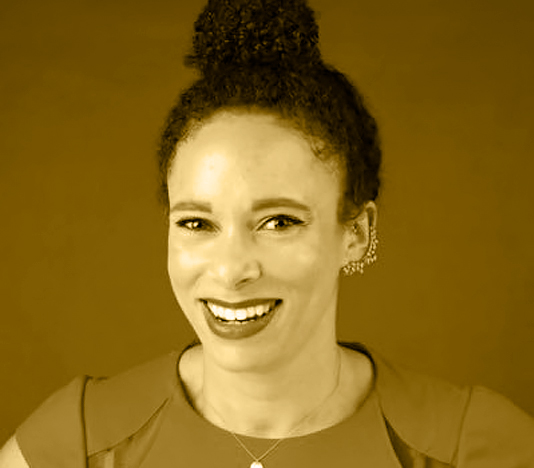It’s gratifying to help police departments re-envision what technology can do."
Meredith Hitchcock

Meredith Hitchcock ’06 grew up near Capitol Hill, and every morning on her drive to grade school her parents were extremely enthusiastic about wanting to teach her the history that had been made in her backyard. She remembers when her father pointed to Constitution Hall and told her how in 1939 opera superstar Marian Anderson was barred from performing there because the building, owned by the Daughters of the American Revolution, banned Black performers.
“I would hear them and think, ‘Yeah, yeah, yeah, more history,’” Hitchcock says with a laugh. “I thought government was boring.” Of course, she adds, “I appreciate with distance and time how foundational growing up in D.C. and the center of government was, and how the city and my parents’ seeds helped shape me.”
For the past six years, Hitchcock has used her skills to develop technological solutions in the service of social justice. “I work with people who do the coding and help guide them in terms of the technology by making sure that anything being built is oriented toward solving real problems for real people, not just to increase revenue by x percent.”
Her interest in technology was first piqued during her lower year at the Academy when she learned simple programming, as well as the importance of being a role model for others. “It’s ironic that the experience of being one of two women and the only Black student in Java and HTML classes at Exeter prepared me for Silicon Valley,” she says. “I learned that I must occupy spaces even if no one else looks like me and not feel intimidated. It also left me with a sense that I have to always pull up an extra chair and mentor women and young people of color.”
Hitchcock studied comparative literature at Yale University, then went to work at Google, where she spent five years as a product specialist in digital publishing while pursuing a master’s degree from the University of California, Berkeley, in information management and systems.
Hitchcock’s tech activism began after she read Michelle Alexander’s groundbreaking book, The New Jim Crow. “I am, by nature, a risk-averse person,” she says, “but a friend pushed me to think about what kind of decisions I would make in my career if I weren’t afraid.”
The question led the 32-year-old to quit her lucrative job at Google and become a justice design fellow for Code for America, a government technology nonprofit where she began developing RideAlong with another fellow. The data-driven criminal justice app helps first responders and police officers de-escalate situations with people who are having a mental health crisis and connect them with social services. So far, 11 American cities, including Seattle, are using the interface to great success. “It’s gratifying to help police departments re-envision what technology can do and help support this shift from the warrior mentality to the guardian mentality,” explains the entrepreneur.
After the app was sold to OpenLattice in 2018, Hitchcock worked at Promise, a cash bail-reform startup. Now she is at Airbnb, where she is a design and user-experience researcher focusing on inclusion, accessibility and equity. During the earlier part of the last year, she collaborated with the company’s philanthropic arm to launch a global initiative to provide free or subsidized housing for COVID-19 health care providers, relief workers and first responders. Hitchcock, who lives in San Francisco, spent hours on virtual calls interviewing hosts. “To be a witness to all the highs and lows people are going through was very powerful,” she says.
During her free time, Hitchcock volunteers with U.S. Digital Response, a nonprofit that works to improve local and state governments’ responses to the COVID-19 pandemic. “I really believe in government now, but in local government in particular, because it has the most immediate impact on the quality of life for people,” she says.
—Sandra Guzmán
Editor’s note: This article first appeared in the winter 2021 issue of The Exeter Bulletin.